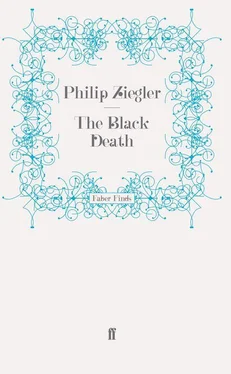But to see the sufferings of Ireland in their proper perspective it is necessary to remember that, in appealing for relief, reference was usually made not only to the plague but also to the ‘other many misfortunes which had happened there’ – ‘the destruction and wasting of lands, houses and possessions by our Irish enemies’. An inquisition of the lands of Roger de Mortimer found ‘a great and flourishing manor, full of free tenants, farmers and burgesses, waste’. The manor of Geashil, belonging to the Earl of Kildare, was ‘worth nothing’. The demesne lands in County Longford ‘lay waste for lack of tenants’. All these statements of sad fact sound familiar enough and could have been culled from the records of any county of England which was recovering from the plague. But in Ireland they stem from the 1320s and 1330s; fruit not of the plague but of the perpetual, ruinous civil war which ravaged the country in the fourteenth as in almost every other century. The Black Death was no less painful to the Irish because they were accustomed to live in a state of even bloodier disorder than their neighbours across the Irish Sea but it should not be forgotten that a high proportion of their misfortunes would have arisen even though there had been no plague to help them forward.
* * *
It would be proper to conclude this tour of the Black Death in Britain with some account of its spread to Scotland. Unfortunately, little detail is recorded. According to Knighton {396} the Scots were delighted when they heard of the fate which had overtaken their hated neighbours in England. They regarded it as a proper retribution for past offences and, as the plague swirled over Cumberland and Durham, massed their forces in the forest of Selkirk, ‘laughing at their enemies’ and awaiting the best moment to invade. It was their last laugh for, as they were on the point of moving into action, ‘the fearful mortality fell upon them and the Scots were scattered by sudden and savage death so that, within a short period, some five thousand died’. The panicstricken soldiers dispersed throughout Scotland, dying by the side of the road or carrying the infection with them to their homes.
‘God and Sen Mungo, Sen Ninian and Seynt Andrew scheld us this day and ilka day fro Goddis grace and the foule deth that Ynglessh men dyene upon.’ {397} Such was the prayer that the Scottish soldier was trained to say as he watched the sufferings of the English on the other side of the frontier. It is certain that his prayers went for little but so little attention is paid to the Black Death by historians of Scotland that one is tempted to believe that St Mungo, St Ninian and St Andrew must have spared their admirers some part at least of the tribulations of other less well protected Europeans. One of the few people living at the time of the plague whose account survives is John of Fordun. {398}
‘In the year 1350,’ he wrote,
there was, in the kingdom of Scotland, so great a pestilence and plague among men… as, from the beginning of the world even unto modern times, had never been heard of by man, nor is found in books, for the enlightenment of those who come after. For, to such a pitch did that plague wreak its cruel spite, that nearly a third of mankind were thereby made to pay the debt of nature. Moreover, by God’s will, this evil led to a strange and unwonted kind of death, insomuch that the flesh of the sick was somehow puffed out and swollen, and they dragged out their earthly life for barely two days. Now this everywhere attacked especially the meaner sort and common people; – seldom the magnates. Men shrank from it so much that, through fear of contagion, sons, fleeing as from the face of leprosy or from an adder, durst not go and see their parents in the throes of death.
This all-too familiar description could have applied as well to any other country. Androw of Wyntoun, {399} who was contemporaneous with John of Fordun but certainly never read the latter’s chronicles, confirms that Scotland suffered severely. {400}
In Scotland, the fyrst Pestilens
Begouth, off sa gret wyolens,
That it was sayd, off lywänd men
The thyrd part it dystroyid then
Efftyr that in till Scotland
A yhere or more it was wedand
Before that tyme was nevyr sene
A pestilens in oure land sa kene:
Bathe men and barnys and women
It sparryed noucht for to kille them.
Finally, the Book of Pluscarden, {401} a slightly later chronicle but still written dose enough to the date of the plague to have some ring of authenticity, also refers to a third of the population being slain and to the poor suffering far worse than the rich.
‘They were attacked with inflammation and lingered barely four and twenty hours,’ noted the anonymous author, concluding more hopefully: ‘The sovereign remedy is to pay vows to St Sebastian, as appears more clearly in the legend of his life.’
The most striking feature of these accounts is the reiterated statement that a third of the population perished. This is a conservative figure compared with the speculation of the chroniclers of other countries whose estimates of the mortality might be anything between fifty and ninety per cent, or even on occasion the entire population. It is perhaps to be expected that the medieval statisticians of Scotland would approach their task with a sobriety not to be found in the English or the still more volatile Latins but, even so, it seems unlikely that they can be acquitted entirely of exaggeration. Unless their estimates were very far out of line with those of other countries the figure of a third must have been substantially too high. If this is so, then Scotland must have escaped more lightly than England or Wales.
The emphasis given to the virtual immunity of the rich and powerful is also interesting. Everywhere it was the poor who suffered worst and, generally speaking, the more eminent the individual’s position, the greater his chances of survival. To take only one example: 18 per cent of the English bishops died as against some 40 per cent of all beneficed clergy. But it was by no means unusual for the great to perish; there are innumerable cases of noblemen or merchants, living in large and spacious houses, who met the same fate as their less prosperous neighbours. Clearly such cases cannot have been unknown in Scotland but John of Fordun’s emphatic statement that ‘the meaner sort and common people’ were above all the victims suggests that the discrepancy was even more marked north of the Tweed.
With lower overall mortality and relatively trivial losses among the nobility and upper levels of society it is less surprising that the plague should have left so light a scar in Scotland. It does not seem, however, to have disturbed the balance of power between England and Scotland, though the failure of the English to win the lasting success which had seemed to be made possible by the rout of the Scots at Neville’s Cross and the capture of King David, can perhaps in part be blamed on the shortage of man-power which resulted from the plague. At all events, the appetite of the Scots for plunder and revenge was temporarily checked and it was several years before they recovered their full zest for forays across the border.
Though cases of the plague occurred north of the border in the autumn of 1349, it seems to have been largely held in check by the Scottish winter. This can, to some extent, be ascribed to the reluctance of rats to change their residence in intense cold but winter does not seem to have been much of an impediment to the advance of the Black Death in other countries. Whatever the reason, the lull was short-lived. In the spring of 1350 the plague was on the move again and quickly blanketed the whole country. By the end of that year all Britain had been infected; all Europe, indeed, since the countries to the north were ravaged at much the same time. In the whole continent, with the exception of a few lucky pockets, hardly a village was left unscathed, hardly an individual can have escaped without the loss of at least one friend or relative. It was a continent in mourning. Millions of fresh graves provided a visible memorial but it was not only the dead who paid the price. To survive the Black Death was not to survive unscathed. Indeed, in some ways, the shock which it inflicted on the minds of men seemed even more significant than the fearful harvest which it had reaped among their bodies.
Читать дальше












